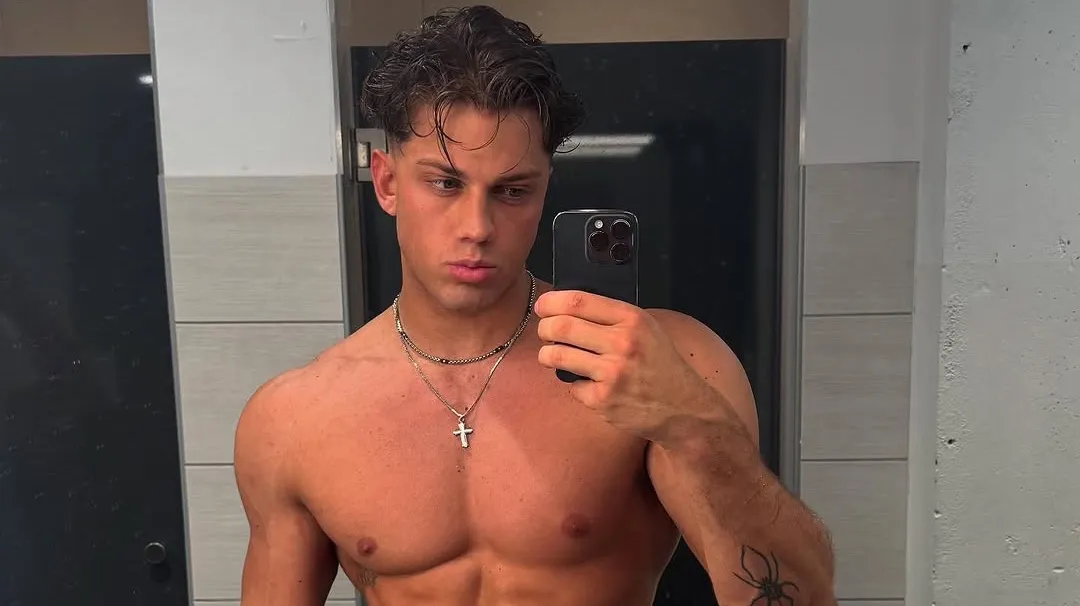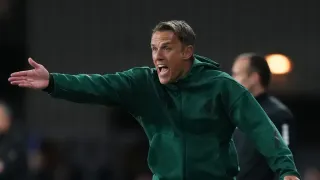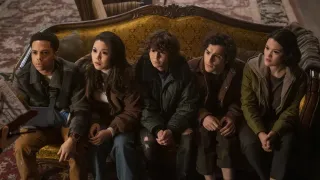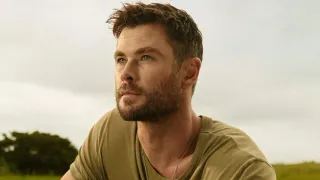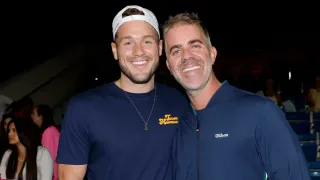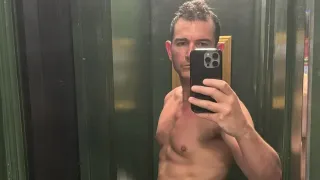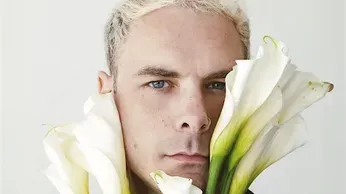
Jun 30
EDGE Interview: Faith, Fear & Frank O'Hara: The Many Lives of David Franklin Courtright
Ryan Reichard READ TIME: 10 MIN.
After nearly a decade in the making, David Franklin Courtright is set to emerge with a new beginning on his album, "Brutal Tenderness," out August 8.
Living up to its name, the record is emotionally expansive, poetically raw and quietly devastating. Having previously released music under the alias Suno Deko, "Brutal Tenderness" sees Courtright step forward under his own name and bringing a collection of deeply personal songs along with him. His single, "Boy," is out now and details the anxiety of queer love as it begins to bloom. A stripped back track, Courtright croons over an acoustic guitar as he wears his heart on his sleeve.
Inspired by the great poet Frank O'Hara, Courtright bares his own poetic heart across the album.
EDGE caught up with Courtright to discuss the gripping project as well as his connections to indie singer-songwriters Mitski and Angel Olson as well as his journey through grief and his relationship with religion. Along the way, Courtright speaks as only a poet could as he opens up about his latest phase in life and what the future might have in store for him.
EDGE: Your new single "Boy" captures the vulnerability and anxiety of early-stage queer love. Can you talk more about writing that song and revisiting such a raw, formative moment in your life?
David Franklin Courtright: The song came from a really personal place. I had just moved to L.A. and met someone I had pretty overwhelming feelings for. We went on a few dates, and on the second one, I was just so in my head. We smoked weed, which made it worse, and I literally had to give myself a pep talk in the mirror - like, "Get it together, be cool." I'd never done that before. I originally wrote it on piano, just a simple two-chord back and forth. The opening line, "On a quiet day, you invited me into your scenery," came quickly. It was all about that feeling of really liking someone but being afraid of messing it up - afraid they'll find out you're not as interesting or attractive as they first thought. My therapist calls it "catastrophizing."
It's also about the queer experience of not always knowing how to be yourself with someone new - because so much of our lives are spent hiding parts of ourselves just to feel safe. And when you finally meet someone who makes you feel seen, it can be terrifying. You want to be loved, but you're scared of what that vulnerability could cost you.
In that particular case, I probably came on too strong. I was ready to run off to Vegas with this person I barely knew. It didn't work out romantically, but we've stayed friends. He's a sweetheart, even if we would've driven each other crazy - he's a Scorpio, and we're both stubborn.
Ultimately, the song is about being too afraid to fall all the way in love. Because when you surrender to those feelings, you open yourself up to being hurt - and that's such a delicate, human place to be.
EDGE: You've mentioned that "Boy" is an ode to being a shy guy. How do you think society - or even queer culture - deals with shyness and sensitivity, especially in contrast to performative confidence?
Courtright: Yeah, I mean, at this point it's kind of a meme - "Are we on a date?" - because in the LGBTQ+ world, especially with same-sex relationships, the lines can be much blurrier.
You made a great point about how so many performers, including drag queens, are actually introverted. The performance is often a way of breaking out of that shell. It's wild how someone can command a stage in front of 5,000 people but completely retreat in a room with just ten. That really resonates with me. I love what I do, but internally I'm an introvert too, and I often feel that same tension.
Social anxiety can be excruciating, especially when you've grown up as a target of ridicule. It makes putting yourself out there really hard. I'm feeling that now with this project. But I think that's kind of the mission behind it all - the "Shy Guy" mission, so to speak - is about transcending that fear and learning to trust in who you are. And to trust that the people around you will love you unconditionally.
EDGE: You've described your debut album "Brutal Tenderness" as a "deep-hearted journey of love and grief." What was the emotional starting point for this album, and how did that evolve over the eight years it took to create?
Courtright: It started as a breakup record. The first song I wrote is also the first track on the album, "My First Love." It straddles the before and after of ending a seven-year relationship. Soon after, I wrote "Garden of Love." Those two songs really anchor the album - that's where "Brutal Tenderness" began.
It was my way of processing the end of a significant chapter. We were together in Atlanta for five years, then moved to New York and broke up. I wanted to explore how both brutality and tenderness can exist at once. The title "Brutal Tenderness" actually comes from a Frank O'Hara poem called River. The moment I read those two words together, I knew I wanted to name the record that. Sometimes titles are hard to find, but this one felt immediate and true.
I've always loved poetry - I'm a poet myself - and Frank O'Hara is a major influence. In fact, the track listing of the album is structured as a standalone poem. I wanted to bridge my different creative worlds. Artists like Bob Dylan, Neil Young and especially Joanna Newsom - my favorite - have shaped how I think about lyrical writing. Words are everything to me. I want them to matter, to tell a story.
Hopefully I channeled some of that raw emotional honesty that O'Hara is known for. Love - especially queer love - exists in such fluid spaces: friend, lover, partner. The boundaries are often invisible. That can be beautiful, but it can also be confusing.
So, the album came from a place of hurt, of trying to make sense of what I was feeling. I wrote most of it while living in Brooklyn, right after the breakup. That was eight years ago now, and we're great friends. I don't feel heartbreak anymore - but this record is a map of how I got through it.
EDGE: You've chosen to release this project under your given name after years of working as Suno Deko. What led you to let go of the moniker, and how does this new chapter reflect your growth artistically and personally?
Courtright: I started Suno Deko when I was living in India. "Suno" means "listen," and "Deko" means "look." The project began as an exploration of loop-based music - something I could build live, layer by layer. I was really inspired by artists like Tune-Yards, Feist, and Mary Lattimore, who use looping not as a gimmick, but as a true artistic palette.
At first, that approach felt exciting and creatively rich. But over time, I started to feel disconnected from it. I began writing more piano-based ballads and realized I no longer felt tied to that looping style - or to the name Suno Deko itself. I had created it as a kind of shield between myself, David, and the world - an alias to hide behind. But I reached a point where I didn't want that separation anymore. I wanted to be the face of the music.
I realized I connected more deeply with artists who bring their full selves to their work - people like Angel Olsen or Weyes Blood. Even though Natalie doesn't use her real name, her music cuts straight to the heart. That's the kind of vulnerability I want in my own work. And I felt that could only happen if I released music under my own name.
Looping had also become limiting. It was fun and visually compelling, but structurally, it boxed me in. It made it hard to write choruses or modulate emotionally and musically. Looking back, I think getting good at looping was a way of avoiding the deeper, harder work - writing from a raw, emotionally urgent place. Now, I want to create music that comes from that place. Music that feels unfiltered, honest and fully me.
EDGE: You've spoken about growing up in an Episcopal church that was unexpectedly one of the queerest spaces in your life. How did that early spiritual environment shape your relationship with your identity and with music?
Courtright: The church was actually a really positive place for me growing up. Both of my parents were very involved.
I didn't realize how special that environment was until I got older. The music of the church was always deeply powerful for me and still is. I go to an Episcopal church here in Koreatown, Los Angeles. It's a place that continues to ground me.
One of the most meaningful parts of my church experience was the rector of my childhood church, Mac. He was a gay man, incredibly warm and authentic. He passed away a few years ago from ALS, but his presence has stayed with me. I later found out that he had also served at the church I now attend in LA.
When I was recording the first Suno Deko full-length, I asked Mac if I could record vocals in the church. He said yes without hesitation. When I asked about a fee, he simply said, "This is your church." That gesture stayed with me. It made the church not just a backdrop to my music, but a deeply supportive and spiritual part of it.
The Episcopal Church is unique in that way. It's had the first gay bishop, the first woman bishop, and people like Bishop Mariann Budde, who challenged Trump early in his presidency. I'm really proud to be part of that tradition.
To me, music - and really any art - is an expression of God. I feel less like a creator and more like a vessel or a channel. I rely on that spiritual connection in my creative process. And having a community that offers unconditional love, no matter who you are, is something we desperately need right now.
I'm not trying to evangelize. I've never told anyone they should go to church. I love when people join me, but I understand that Christianity is complicated - especially for queer people. Most have trauma around it. I'm the exception. I've had a deeply queer-positive Christian experience, and I'm grateful for that.
EDGE: You've toured with artists like Angel Olsen, Mitski, and Moses Sumney - how have those collaborations and shared stages influenced your sound or sense of musical purpose?
Courtright: It was really cool coming up alongside artists like Moses Sumney and Mitski. We were all opening for Hundred Waters - good friends of mine - right before Moses and Mitski really took off. I remember Mitski playing for 15 people at The Masquerade in Atlanta and crashing on my couch. Now she's selling out SummerStage and doing arena tours.
Touring with Angel Olsen was something I never imagined. I remember lying on the floor listening to Half Way Home on vinyl - her voice and expression have always cut straight to the heart. That's what I aspire to in my own music: something emotionally honest that offers people a safe place to feel.
Ultimately, my goal is to make music that belongs to other people in a deep way. Angel's music has always done that for me, so when she asked me to tour with her, I was overwhelmed - in a good and bad way. I wrote "Feels" just two days before that tour started, but I was battling intense imposter syndrome. I was convinced she'd figure out I wasn't good enough and kick me off the tour.
But it ended up being magical. We played in Italy and in a 15th-century church in the Belgian countryside. She even sang on the last song of the album, "In a Tangerine Light." She made up a vocal part backstage during our final show in Santiago de Compostela, and then recorded it in my bedroom in LA.
It still blows my mind that her voice is on that track. It's one of the most transcendent songs I've made, and I can't wait for people to hear it.
EDGE: You've described "Brutal Tenderness" as a breakup album. But what would you tell that person that eight years ago, when you started writing the album? What would you tell them today, now that you've made this reclamation through music?
Courtright: I would tell them that things are about to get really, really, really bad, but you're going to be okay. And the person that you will be on the other side will be someone that you love very much.
EDGE: While you are releasing an album and have shows planned in LA, New York and Georgia, what does the next year after this album's release look like for you?
Courtright: We're about to announce a London show for late September, which I'm really excited about. Beyond that, I'm open to whatever comes next. If tour support opportunities come up, I'm definitely interested. One upside of taking eight years to make this record is that I've built up a big backlog of songs - more than enough for another album.
The plan is to keep momentum going, hopefully releasing another album next year or shortly after. Unless something unexpected happens - like Chappell Roan asking me to open her arena tour - I'll likely spend the fall in crunch mode, recording the next body of work.
Outside of music, I'm also writing a novel and working on a poetry series. After my dad died, I started writing a poem a day and ended up doing it for 101 days straight. I shared them on Instagram without planning to, but the response was overwhelming - especially from people who had experienced loss. That project made me realize how art can be a tool for healing. Grief can feel isolating, and when someone sees their own pain reflected in your work, it can be comforting. It reminds them they're not alone.
It's been a chaotic few years - my dad's passing, and then my mom had a serious injury on Easter and had to relearn how to walk. She's almost fully recovered now, thankfully. But honestly, I'd love for life to calm down a bit.
